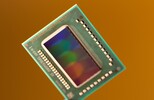Intel Core i7-4700HQ vs Intel Core i7-3740QM
Intel Core i7-4700HQ
► remove from comparison
Der Intel Core i7-4700HQ ist ein schneller mobiler Quad-Core Prozessor auf Basis der Haswell-Architektur. Dank Hyperthreading können die 4 Kerne gleichzeitig bis zu 8 Threads bearbeiten. Die in 22 Nanometer gefertigte CPU taktet mit 2,4 GHz, kann per Turbo Boost aber Frequenzen von bis zu 3,4 GHz erreichen (Turbo-Stufen: 4 Kerne: 3,2 GHz, 2 Kerne: 3,3 GHz).
Haswell ist der Nachfolger der 2012 vorgestellten Ivy-Bridge-Architektur und soll vor allem mit höherer Performance und verbesserter Energieeffizienz punkten. So wurde sowohl die Sprungvorhersage optimiert als auch die Zahl der Ausführungseinheiten erhöht, wodurch die Pro-MHz-Leistung um etwa 5 bis 10 Prozent gesteigert werden konnte. Neue Befehlssatzerweiterungen wie AVX2 und FMA sollen die Performance in darauf ausgelegten Anwendungen zusätzlich verbessern.
Die Performance des Core i7-4700HQ liegt dank der leicht verbesserten Pro-MHz-Leistung rund 10 Prozent über dem Core i7-3630QM. Dies reicht aus, um den Core i7-3720QM zu erreichen. Auch anspruchsvollste Anwendungen bewältigt der i7-4700HQ damit ohne Probleme.
Für die Grafikausgabe zeigt sich die im Prozessor integrierte Intel HD Graphics 4600 verantwortlich, die mit 400 - 1200 MHz taktet. Diese verspricht ein Performanceplus von rund 30 Prozent gegenüber der HD Graphics 4000, was die HD 4600 nahe an die Grafikeinheit der schnellsten Trinity-APUs von AMD heranbringt.
Gegenüber dem Vorgänger ist die maximale Leistungsaufnahme des i7-4700HQ auf 47 Watt (TDP) angestiegen, was auf die Integration der Spannungsregler in die CPU zurückzuführen ist. Damit ist die CPU lediglich für große Notebooks ab 15 Zoll geeignet.
Intel Core i7-3740QM
► remove from comparison
Der Intel Core i7-3740QM ist ein schneller mobiler Quad-Core Prozessor basierend auf der Ivy Bridge Architektur und Nachfolger des i7-3720QM. Dank Hyperthreading können die 4 Kerne gleichzeitig bis zu 8 Threads bearbeiten. Die Fertigung erfolgt im Gegensatz zum Vorgänger Sandy Bridge, der noch in 32 Nanometer produziert wurde, in einem kleineren 22 Nanometer Prozess mit 3D-Transistoren. Mit einer Taktrate von 2,7 GHz (maximaler Turbo: 3,5 GHz für 4 Kerne, 3,6 GHz für 2 Kerne, 3,7 GHz für 1 Kern) befindet sich der i7-3740QM knapp unter dem i7-3840QM (2,8 GHz), der zudem den größeren L3-Cache (8 MB statt 6 MB) besitzt.
Ivy Bridge ist ein Die Shrink der Sandy Bridge Architektur, der nur an wenigen Stellen verbessert wurde. Unter anderem werden nun PCI Express in der neuen Version 3.0 sowie DDR3(L)-1600 unterstützt. Keine Änderungen gab es beim Featureset, welches weiterhin beispielsweise die Verschlüsselungstechnik AES-NI, die Befehlssatzerweiterung AVX sowie Turbo-Boost 2.0 umfasst. Die größten Änderungen gab es bei der integrierten Prozessorgrafikkarte und den Multimedia Features.
Die Performance des i7-3740QM liegt durch kleinere Verbesserungen der Pro-MHz-Leistung etwa 5 % über einem taktgleichen Modell der Sandy Bridge Architektur. Verglichen mit dem i7-3840QM fällt der Prozessor etwa 5 % zurück und erreicht knapp den i7-3820QM. Dies genügt, um selbst anspruchsvolle Anwendungen wie HD-Videoschnitt oder aktuelle 3D-Spiele mit Leichtigkeit zu meistern.
Für die Grafikausgabe zeigt sich die im Prozessor integrierte Intel HD Graphics 4000 mit 16 sogenannten Execution Units (EUs) verantwortlich, die mit 650 - 1300 MHz takten. Die Leistung liegt um etwa 40 % über der des Vorgängers (HD Graphics 3000), womit auch die Grafiklösung von Llano (Radeon HD 6620G als schnellstes Modell) erreicht bzw. teils übertroffen wird.
Wie die meisten Quadcore-Modelle der Sandy Bridge Reihe besitzt auch der i7-3740QM eine TDP von 45 Watt, die auch die Grafikeinheit beinhaltet. Damit ist die CPU lediglich für große Notebooks ab 15 Zoll aufwärts geeignet.
| Model | Intel Core i7-4700HQ | Intel Core i7-3740QM | ||||||||||||||||||||||||||||||||||||||||||||||||||||||||||||||||||||||||||||||||||||||||||||||||||||||||||||||||||||||||||||||||||||||||||||||||||||||||||||||||||||||||||||||||||||||||||||||||||||||||||||||||||||||||
| Codename | Haswell | Ivy Bridge | ||||||||||||||||||||||||||||||||||||||||||||||||||||||||||||||||||||||||||||||||||||||||||||||||||||||||||||||||||||||||||||||||||||||||||||||||||||||||||||||||||||||||||||||||||||||||||||||||||||||||||||||||||||||||
| Series | Intel Core i7 | Intel Core i7 | ||||||||||||||||||||||||||||||||||||||||||||||||||||||||||||||||||||||||||||||||||||||||||||||||||||||||||||||||||||||||||||||||||||||||||||||||||||||||||||||||||||||||||||||||||||||||||||||||||||||||||||||||||||||||
| Serie: Core i7 Ivy Bridge |
|
| ||||||||||||||||||||||||||||||||||||||||||||||||||||||||||||||||||||||||||||||||||||||||||||||||||||||||||||||||||||||||||||||||||||||||||||||||||||||||||||||||||||||||||||||||||||||||||||||||||||||||||||||||||||||||
| Clock | 2400 - 3400 MHz | 2700 - 3700 MHz | ||||||||||||||||||||||||||||||||||||||||||||||||||||||||||||||||||||||||||||||||||||||||||||||||||||||||||||||||||||||||||||||||||||||||||||||||||||||||||||||||||||||||||||||||||||||||||||||||||||||||||||||||||||||||
| L1 Cache | 256 KB | 256 KB | ||||||||||||||||||||||||||||||||||||||||||||||||||||||||||||||||||||||||||||||||||||||||||||||||||||||||||||||||||||||||||||||||||||||||||||||||||||||||||||||||||||||||||||||||||||||||||||||||||||||||||||||||||||||||
| L2 Cache | 1 MB | 1 MB | ||||||||||||||||||||||||||||||||||||||||||||||||||||||||||||||||||||||||||||||||||||||||||||||||||||||||||||||||||||||||||||||||||||||||||||||||||||||||||||||||||||||||||||||||||||||||||||||||||||||||||||||||||||||||
| L3 Cache | 6 MB | 6 MB | ||||||||||||||||||||||||||||||||||||||||||||||||||||||||||||||||||||||||||||||||||||||||||||||||||||||||||||||||||||||||||||||||||||||||||||||||||||||||||||||||||||||||||||||||||||||||||||||||||||||||||||||||||||||||
| Cores / Threads | 4 / 8 | 4 / 8 | ||||||||||||||||||||||||||||||||||||||||||||||||||||||||||||||||||||||||||||||||||||||||||||||||||||||||||||||||||||||||||||||||||||||||||||||||||||||||||||||||||||||||||||||||||||||||||||||||||||||||||||||||||||||||
| TDP | 47 Watt | 45 Watt | ||||||||||||||||||||||||||||||||||||||||||||||||||||||||||||||||||||||||||||||||||||||||||||||||||||||||||||||||||||||||||||||||||||||||||||||||||||||||||||||||||||||||||||||||||||||||||||||||||||||||||||||||||||||||
| Transistors | 1400 Million | 1400 Million | ||||||||||||||||||||||||||||||||||||||||||||||||||||||||||||||||||||||||||||||||||||||||||||||||||||||||||||||||||||||||||||||||||||||||||||||||||||||||||||||||||||||||||||||||||||||||||||||||||||||||||||||||||||||||
| Technology | 22 nm | 22 nm | ||||||||||||||||||||||||||||||||||||||||||||||||||||||||||||||||||||||||||||||||||||||||||||||||||||||||||||||||||||||||||||||||||||||||||||||||||||||||||||||||||||||||||||||||||||||||||||||||||||||||||||||||||||||||
| Die Size | 177 mm2 | 160 mm2 | ||||||||||||||||||||||||||||||||||||||||||||||||||||||||||||||||||||||||||||||||||||||||||||||||||||||||||||||||||||||||||||||||||||||||||||||||||||||||||||||||||||||||||||||||||||||||||||||||||||||||||||||||||||||||
| max. Temp. | 100 °C | 105 °C | ||||||||||||||||||||||||||||||||||||||||||||||||||||||||||||||||||||||||||||||||||||||||||||||||||||||||||||||||||||||||||||||||||||||||||||||||||||||||||||||||||||||||||||||||||||||||||||||||||||||||||||||||||||||||
| Socket | FCBGA1364 | FCBGA1224, FCPGA988 | ||||||||||||||||||||||||||||||||||||||||||||||||||||||||||||||||||||||||||||||||||||||||||||||||||||||||||||||||||||||||||||||||||||||||||||||||||||||||||||||||||||||||||||||||||||||||||||||||||||||||||||||||||||||||
| Features | HD Graphics 4600 (400 - 1200 MHz), DDR3(L)-1600 Memory Controller, HyperThreading, AVX, AVX2, Quick Sync, Virtualization, AES-NI | HD Graphics 4000, DDR3(L)-1600 Memory Controller, HyperThreading, AVX, Quick Sync, Virtualization | ||||||||||||||||||||||||||||||||||||||||||||||||||||||||||||||||||||||||||||||||||||||||||||||||||||||||||||||||||||||||||||||||||||||||||||||||||||||||||||||||||||||||||||||||||||||||||||||||||||||||||||||||||||||||
| iGPU | Intel HD Graphics 4600 (400 - 1200 MHz) | Intel HD Graphics 4000 (650 - 1300 MHz) | ||||||||||||||||||||||||||||||||||||||||||||||||||||||||||||||||||||||||||||||||||||||||||||||||||||||||||||||||||||||||||||||||||||||||||||||||||||||||||||||||||||||||||||||||||||||||||||||||||||||||||||||||||||||||
| Architecture | x86 | x86 | ||||||||||||||||||||||||||||||||||||||||||||||||||||||||||||||||||||||||||||||||||||||||||||||||||||||||||||||||||||||||||||||||||||||||||||||||||||||||||||||||||||||||||||||||||||||||||||||||||||||||||||||||||||||||
| $378 U.S. | $378 U.S. | |||||||||||||||||||||||||||||||||||||||||||||||||||||||||||||||||||||||||||||||||||||||||||||||||||||||||||||||||||||||||||||||||||||||||||||||||||||||||||||||||||||||||||||||||||||||||||||||||||||||||||||||||||||||||
| Announced | ||||||||||||||||||||||||||||||||||||||||||||||||||||||||||||||||||||||||||||||||||||||||||||||||||||||||||||||||||||||||||||||||||||||||||||||||||||||||||||||||||||||||||||||||||||||||||||||||||||||||||||||||||||||||||
| Manufacturer | ark.intel.com |
Benchmarks
Average Benchmarks Intel Core i7-4700HQ → 100% n=19
Average Benchmarks Intel Core i7-3740QM → 105% n=19
* Smaller numbers mean a higher performance
1 This benchmark is not used for the average calculation













